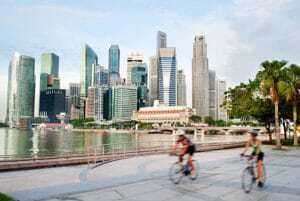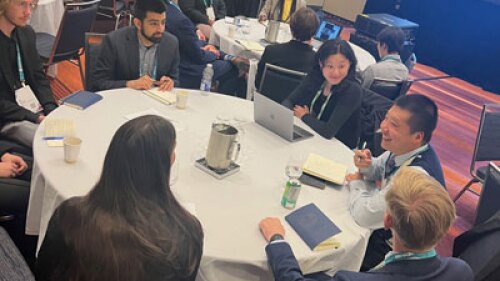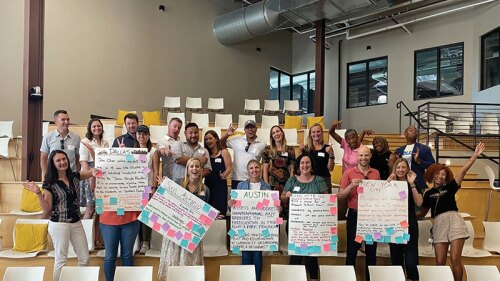Known as a multicultural melting pot, Singapore is famous for its vibrant street food scene, gleaming high rises, and immaculate public spaces. It is also one of the world’s most forward-thinking cities on embracing density, sustainability, and livability as guiding principles for urban design and development in a resource-constrained environment.
In June, Singapore’s planning acumen and other attributes will be on display during the sixth annual Asia Pacific Summit, where participants from the region and beyond will get to experience the city-state of 5.5 million residents for themselves. “It’s the first time the meeting will be held in Southeast Asia, which is incredibly exciting for us,” says host committee chairman Scott Dunn, vice president for Southeast Asia at AECOM and a leading ULI Singapore member. “Singapore truly is the economic hub for Asia and serves as a crossroads for commerce and culture where people from all parts of the globe—Asia, Australia, Europe, the Americas—converge to do business.”
At 278 square miles (720 sq km), Singapore’s land mass is limited for development, so the government must innovate when crafting policies that encourage efficient uses of land and development types, such as mixed use, high and medium densities, and transit-oriented development. The country has no natural water supply, but a long-term strategy anchored on desalinization and recycling has meant few shortages. “Access to resources is limited, so the government has to be really innovative when it comes to resources,” Dunn says. “It also has to think about what’s best for the entire island and not a single constituency.”
Singapore’s other major influence on the built environment is a stable political structure that has allowed pursuit of a long-term vision, Dunn explains. Political cycles last longer and are less volatile, allowing a consistent approach to development, support for infrastructure, and a predictable environment for global business. Government agencies such as the Urban Redevelopment Authority, Housing & Development Board, and Land Transport Authority have thoughtfully pursued plans for housing development, commercial development, and transportation networks in ways that foster economic growth, a high standard of living, a respect for the natural environment, and the preservation of historic architecture.
“The way Singapore thinks and plans about the future is unique and frees them up to create innovative solutions that go beyond simply what is required,” Dunn says. “Singapore has always taken a long-term planning approach. The way the government is structured allows leadership to do that.”
Tours to Spotlight Singapore’s Unique Approach
The summit will offer several tours providing participants with an opportunity to gain understanding of Singapore’s creative and deliberate approach to urbanization through real-world examples.
A tour of mixed-use industrial districts will demonstrate the evolving needs of Singapore’s dynamic manufacturing sector. More and more, companies are taking a “blended” approach, locating manufacturing, office space, and research and development labs in the same facility, Dunn says. A tour of Singapore’s port and logistics real estate will provide a glimpse of the city-state’s $18.4 billion logistics industry, considered a primary hub for logistics and supply-chain management in Asia. In commercial and industrial real estate, vertical construction and tilt-up construction methods—in which walls are fabricated from large slabs of poured concrete that are then tilted up—have become common ways to save time, money, and resources.
Housing, too, is a sector where Singapore’s approach has worked: more than 80 percent of its population lives in public housing, developed by the Housing & Development Board, an agency led by 2016 J.C. Nichols Prize laureate Dr. Cheong Koon Hean. Yet Singapore’s promotion of homeownership means that the majority of the residents own their flats rather than rents them. Participants will have the opportunity to tour several housing estates with different development types—from high rises in the central business district to low-rise models in new towns such as Punggol.
“The tour will take people through different housing typologies,” Dunn says. “Public housing is evolving and catering to different types of end users who vary by age and income.”
Understanding new and creative approaches to development in a land-constrained environment offers useful lessons to cities around the world, many of which are pursuing compact, dense development to manage growth, Dunn says.
A tour of Marina Bay, the waterfront development that has transformed Singapore into a global destination for tourism and business travel, will convey the effectiveness of public/private partnerships in Singapore. With the goal of expanding the city’s central business district and creating a new 24/7 highly amenitized district, the government invested $4.5 billion at Marina Bay, filling in 2.2 square miles (5.7 sq km) of the bay and constructing a waterfront promenade, pedestrian bridge, event plaza, and other public spaces.
The massive public investment in infrastructure has resulted in nearly triple that amount in private investment in Marina Bay. Marquee developments such as the lavish Marina Bay Sands hotel, casino, and convention center; the ArtScience Museum; and the Sands SkyPark—a cantilevered observation deck that offers a 460-foot-long (140 m) infinity pool and a 360-degree view of the city—have redefined Singapore’s skyline. Luxury residences and Gardens by the Bay, a 250-acre (100 ha) public park with lush landscaped gardens and conservatories, have rounded out the experience of Marina Bay, which was a finalist for a ULI Urban Open Space Award in 2015. The entire district offers residents and travelers an array of shopping, leisure, and recreational experiences.
“Both public and private sectors in Singapore wanted to create a signature tourism experience with Marina Bay,” Dunn says. “The public sector set the stage to really activate the waterfront, and projects such as Marina Bay Sands and Gardens by the Bay have successfully created that interface with the water.”
The Perfect Place to Connect
In addition to being a case study of best practices for urban development, Singapore has evolved into a dynamic gathering place. The 2017 Asia Pacific Summit will offer ample opportunities to connect with partners, potential clients, and friends. The Fullerton Hotel, the summit’s main venue, is perfectly situated in the heart of downtown and offers many private spaces to meet for a drink or a meal. Singapore’s world-famous culinary scene will be on full display, ranging from Michelin-starred restaurants with celebrity chefs at the helm to hawker centers offering a full range of Indian, Chinese, and Malaysian street food.
“The summit offers a tremendous opportunity to come and talk about your business, find prospective clients or partners, and learn from the very best in our field,” Dunn adds. “And it’s also a chance to experience one of the most vibrant and global cities in the world. We encourage everyone to come and experience the very best Singapore and Southeast Asia have to offer in terms of food, culture, recreation, and hospitality. We look forward to hosting you.”
Register now for the 2017 Asia Pacific Summit. Visit apacsummit.uli.org.




